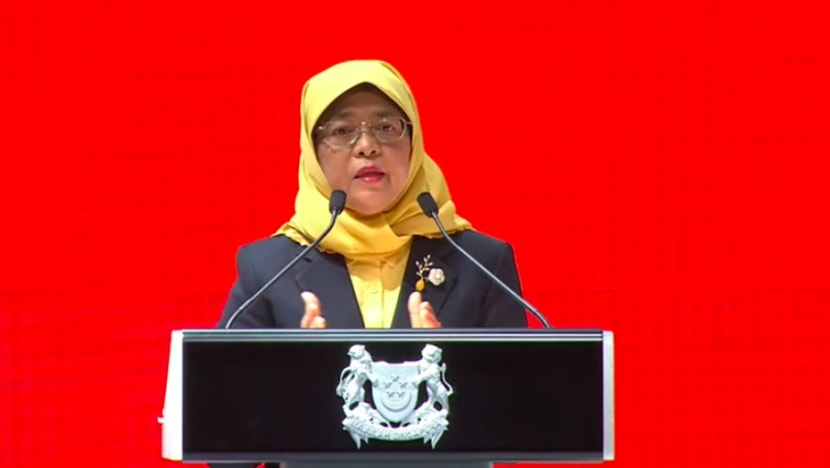Decisive actions and agreed outcomes are ‘vital’ in tackling the climate crisis: President Halimah

A screenshot of President Halimah Yacob delivering her keynote address at sustainability conference Ecosperity 2021 on Sep 28.
SINGAPORE: Robust dialogues, agreed outcomes and decisive actions are vital in the collective fight against the climate crisis, said President Halimah Yacob on Tuesday (Sep 28).
In her keynote address at sustainability conference Ecosperity Week, she warned that inaction to threats such as climate change could have “dire consequences".
“Over the past year-and-a-half, the COVID-19 pandemic has taken a significant toll on lives and livelihoods, and disrupted the plans of many,” Mdm Halimah said. “It has also alerted us to other threats to our societies, including climate change.”
“There will be dire consequences of inaction to such threats, which we can now see clearly,” she added. “We are living amid a climate crisis, and its impact could potentially be more severe than this pandemic.”
Last month, the United Nation’s Intergovernmental Panel on Climate Change (IPCC) released a major report detailing the latest scientific assessments of climate change.
It warned that unless deep – and quick – cuts in carbon dioxide and other greenhouse gas emissions are made, global surface temperatures will surpass the threshold limit of 1.5 degrees Celsius under the 2015 Paris agreement sometime in the early 2030s.
While climate change will affect every region, Mdm Halimah noted that the effects on Southeast Asia, however, could be disproportionate.
Citing the Climate Economics Index by the Swiss Re Institute, she said that if nothing is done and temperatures rise by 3.2 degrees Celsius by mid-century, the gross domestic product (GDP) of ASEAN economies could be over a third smaller than what it would have been in a world without warming.
The region’s long coastlines and heavily populated low-lying areas also make it particularly vulnerable to rising sea levels caused by global warming, she said.
If sea levels rise by one metre, at least 89 million people in the region would be living in zones at high risk of frequent coastal flooding, she added.
To combat climate change effectively, Mdm Halimah said a “strong and robust” public-private-people partnership is essential.
To this end, Singapore has set out a whole-of-nation green plan which will chart the country’s sustainable goals and targets over the next decade.
“It will require the collective action of all stakeholders to capture the opportunities, as well as meet the challenges of our transition to a net-zero future,” said Mdm Halimah.
A series of conversations on the country’s green plan, which was launched earlier this year, will help to facilitate collective action, by engaging Singaporeans from diverse backgrounds on their views and ideas for climate action.
Organised by state investor Temasek, this year’s Ecosperity Week will see discussions on decarbonisation and climate action, reimagining nature and resources, and sustainable investing and financing.
The three-day conference, which ends on Sep 30, will rally global business leaders, policy-makers, investors and civil society to take an urgent and collective response to the global climate emergency, helping to chart a roadmap for a sustainable future.
















